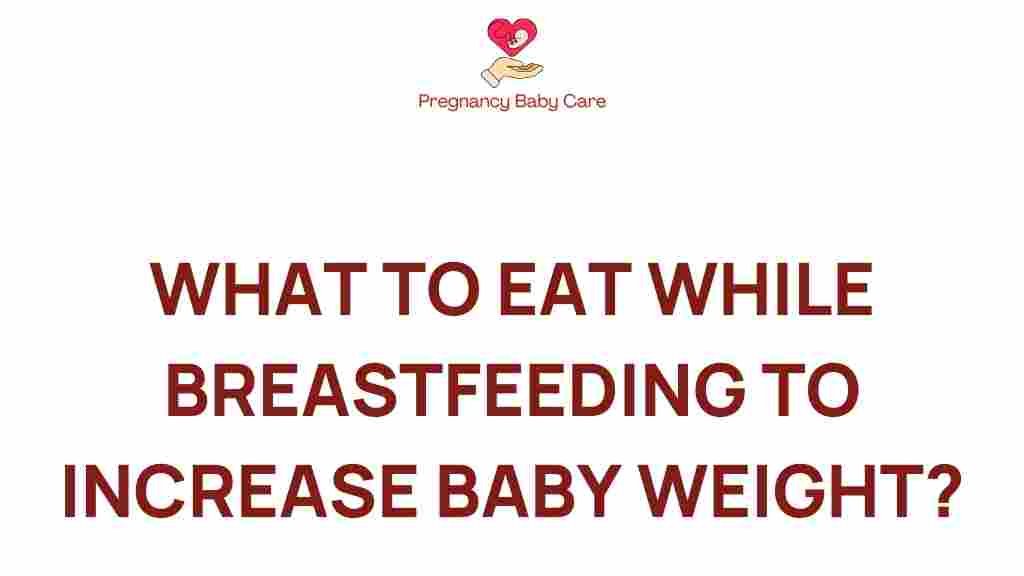Nourishing Choices: What to Eat While Breastfeeding for Healthy Baby Weight
Breastfeeding is a beautiful and vital part of nurturing your newborn. As a new mother, your nutrition is key not only for your health but also for your baby’s growth and development. The choices you make in your maternal diet can significantly influence your baby’s weight gain and overall health. In this article, we will explore essential breastfeeding tips, nutritional needs during lactation, and how to maintain healthy eating habits to support both you and your infant.
The Importance of Nutrition During Breastfeeding
When you breastfeed, your body requires extra energy and nutrients to produce milk. A well-balanced diet is crucial for ensuring that both you and your baby receive the necessary nutrients for optimal growth and postpartum health. Here are some critical aspects of nutrition during breastfeeding:
- Increased Caloric Needs: Breastfeeding mothers typically need about 300 to 500 extra calories per day.
- Hydration: Staying hydrated is vital as breastfeeding can cause increased thirst.
- Essential Nutrients: Focus on vitamins, minerals, protein, healthy fats, and carbohydrates.
Key Nutrients for Breastfeeding Mothers
Here are some of the most important nutrients you should focus on while breastfeeding:
- Protein: Essential for milk production. Include lean meats, fish, eggs, and legumes.
- Calcium: Important for your baby’s bone development. Sources include dairy products, leafy greens, and fortified alternatives.
- Iron: Necessary for your energy and your baby’s growth. Include red meat, beans, and fortified cereals.
- Omega-3 Fatty Acids: Crucial for brain development. Found in fatty fish, flaxseeds, and walnuts.
- Folic Acid: Supports infant growth. Green leafy vegetables, fruits, and fortified grains are excellent sources.
Healthy Eating Tips for Nursing Moms
Maintaining a healthy diet while breastfeeding will help manage your postpartum health and support your baby’s weight gain. Here are some practical breastfeeding tips for healthy eating:
1. Plan Balanced Meals
Your meals should include a mix of the following:
- Fruits and Vegetables: Aim for a variety of colors to ensure a broad range of nutrients.
- Whole Grains: Choose whole grain bread, brown rice, and oats for sustained energy.
- Lean Proteins: Incorporate chicken, turkey, fish, tofu, and beans.
- Healthy Fats: Include avocados, nuts, seeds, and olive oil.
2. Snack Wisely
Healthy snacks can help maintain your energy levels. Opt for:
- Greek yogurt with fruit
- Nuts and seeds
- Vegetable sticks with hummus
- Whole grain crackers with cheese
3. Stay Hydrated
Drink plenty of fluids throughout the day. Water, herbal teas, and smoothies are excellent choices. Avoid excessive caffeine and sugary drinks, as they can affect your baby’s sleep patterns.
Understanding Baby Weight and Growth Patterns
Monitoring your baby’s weight is crucial during the first year. Breastfeeding supports healthy infant growth, but it’s important to understand what constitutes healthy baby weight:
- Newborn Weight: Most babies lose a small percentage of their birth weight in the first few days.
- Weight Gain: Expect your baby to regain their birth weight by about two weeks and gain approximately 5-7 ounces per week during the first few months.
- Growth Spurts: Be prepared for periods of increased feeding as your baby grows, typically occurring around 2-3 weeks, 6 weeks, and around 3 months.
What To Avoid While Breastfeeding
While nutritious foods are vital, certain substances can affect your milk and your baby’s health:
- Alcohol: Limit or avoid alcohol as it can pass into breast milk.
- Caffeine: Keep caffeine intake to a minimum.
- Processed Foods: Avoid trans fats and high-sugar foods that offer little nutritional value.
Common Challenges in Maternal Nutrition During Lactation
Despite the best intentions, new mothers can face challenges in maintaining proper nutrition. Here are some common issues and troubleshooting tips:
1. Lack of Time
New mothers often struggle to find time for meal prep. Consider:
- Batch cooking meals when you have time.
- Utilizing slow cookers or instant pots for easy meal preparation.
- Prepping snacks in advance for quick access.
2. Changes in Appetite
Some women may experience fluctuations in appetite due to hormonal changes. If you’re not feeling hungry:
- Try smaller, more frequent meals rather than three large ones.
- Focus on nutrient-dense snacks.
3. Cravings for Unhealthy Foods
Cravings are normal but can lead to unhealthy choices. Consider these tips:
- Allow yourself occasional treats but focus on moderation.
- Find healthier alternatives to satisfy cravings, like fruit instead of candy.
Conclusion: Embracing Healthy Choices for You and Your Baby
Your nutritional choices during breastfeeding are pivotal for your baby’s weight and overall health. By focusing on a balanced maternal diet rich in essential nutrients, you’ll support not only your postpartum health but also your baby’s growth and development. Remember, every mother’s journey is unique, so listen to your body and consult with healthcare professionals for personalized advice.
For more breastfeeding tips and resources, check out this comprehensive guide. You can also explore external resources for further information on infant nutrition and growth.
By making nourishing choices, you can ensure a healthy start for your baby while taking care of your own well-being.
This article is in the category Feeding and created by PregnancyBabyCare Team
